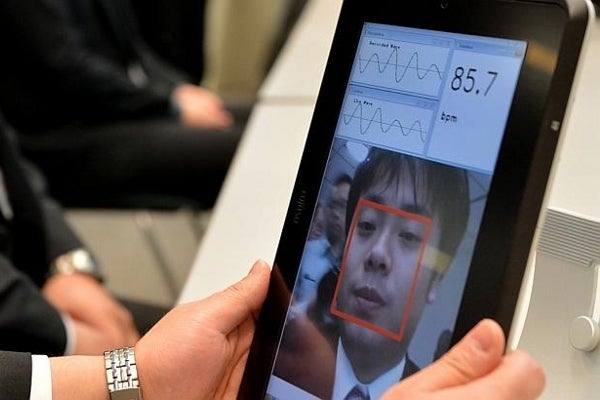Fujitsu smartphone camera software can monitor your pulse

Smartphone software developed by Fujitsu is capable of reading a person’s pulse just by looking at their face through the camera for five seconds.
The Japanese technology firm says the software could provide major health and security benefits in the future, once the company puts the invention to practical use.
It could enable smartphone users to monitor their health and collect pulse data for medical reasons quickly and easily from their homes or workplaces, without having to employ any special equipment.
“Even at a busy workplace, or any time a person is sitting in front of a PC, whether for teleconferencing or writing e-mails their pulse can be measured during brief moments of quiet,” said the company in a statement.
The technology operates by monitoring the various variations in a person’s face caused by the flow of blood in the tiny facial vessels. The software monitors haemoglobin, which is a protein found in red blood cells that contains iron and transports oxygen.
“One characteristic of haemoglobin in blood is that it absorbs green light. Based on this fact, Fujitsu Laboratories has developed a technology that detects a person’s pulse by measuring changes in the brightness of the person’s face as blood flows through it,” said Fujitsu.
“The technology starts to work by shooting video of a subject and calculating average values for the colour components (red/green/blue) in a certain area of the face for each frame. Next it removes irrelevant signal data that is present in all three colour components and extracts the brightness waveform from the green component.”
Fujitsu aims to commercialise the technology within the next 12 months, bringing the software to the marketplace before April 2014. The Japanese technology company suggest that the pulse detectors could be used for potential health and security indicators for the general public.
Sensors built into gates at public events, like concerts or conventions, could detect anyone attending with poor health or medical issues. The technology could also be introduced to airports or anywhere with high security risks to help identify anyone acting suspiciously and therefore having a higher pulse rate.
A similar pulse solution is already on the market. Cardiio is a health app available from the App Store for £1.99, which uses the front camera on the iPhone to analyse the amount of light reflected off the user’s face. The app has received plenty of critical acclaim since its release in August last year.
Do you think this pulse rate technology could be a useful addition to smartphones? Or would the heart rate sensors in public places be an invasion of privacy? Give us your thoughts via the TrustedReviews Facebook and Twitter pages or the comments below.
Via: Independent

